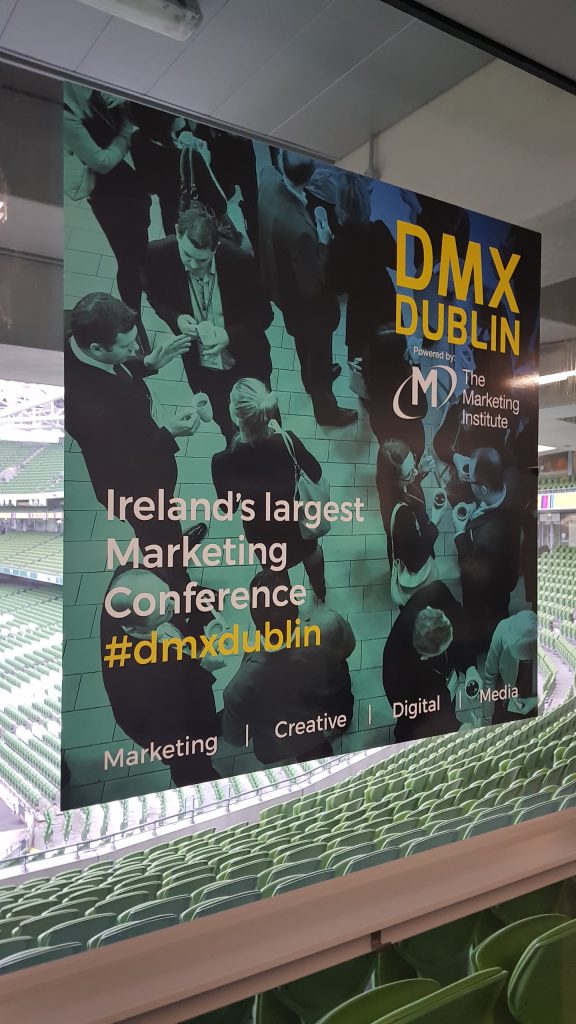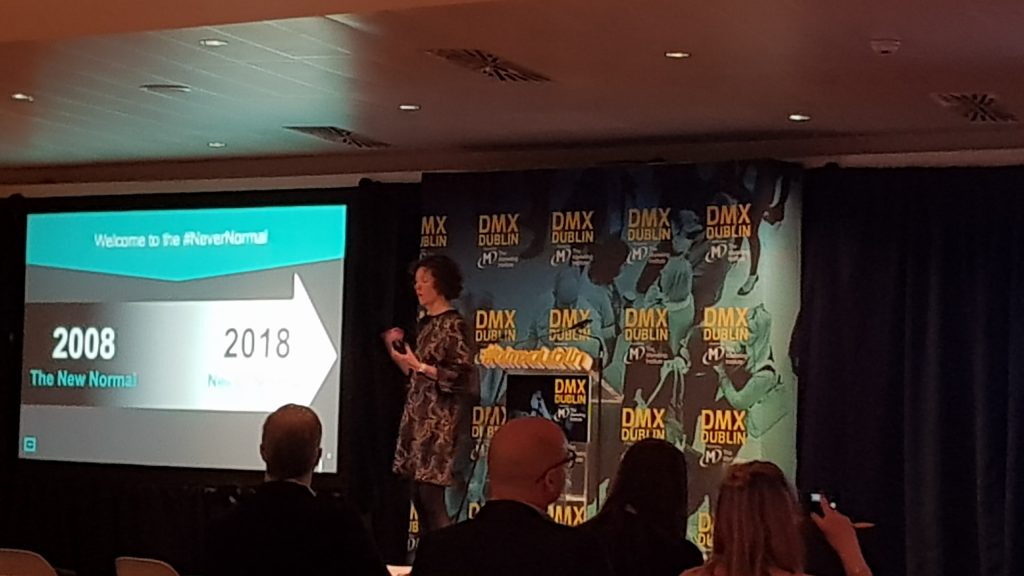Hundreds of rain-soaked digital devotees gathered together with an appetite for knowledge (and coffee. There must always be coffee). The line up was broad and varied, with speakers from different countries and backgrounds, all offering their view on what to watch in Digital Marketing in the coming months. Read on for a breakdown of Threesixty’s favourite sessions and insights…

It was standing room only at the Storyful session on “Getting Clued In: The Journey from Insights to Creative”. Jaclyn Kalb and Julien Goretti gave a interesting talk on how social intelligence is a crucial aspect to any successful marketing campaign. What is social intelligence? Some would call it ‘common sense’, others “cop on” but it basically means having an awareness of context, of audience sentiment and of ultimately your brand position/ perception, and ensuring that your digital marketing is aligned to all three. It means being able to ‘read the room’ and work out if sending ‘that’ tweet or posting ‘that’ image, will result in a flurry of backlash. Brands who have failed at this recently include: Pepsi and Dove. Sometimes, in the rush to jump on a trend bandwagon, brands fail to step back and take a minute to consider – is this really right for us?
Our take out: Social Intelligence is definitely important, but for us, even more important is starting your digital marketing plan with a clear Brand Strategy. A clear position and plan which informs and guides every marketing decision. If it’s not aligned to the brand strategy, then don’t do it. The ‘context’ part is trickier – but generally, if it doesn’t ‘feel’ right, then it’s probably wrong. If in doubt, leave it out. Ensure that safeguards are in place for your brand’s social postings – What’s your social media policy? Do you have a crisis response plan? Who is ultimately responsible for the output of your social media channels? A social media ‘fail’ for a B2B brand makes it look out of touch and irrelevant – not ideal.
Yvonne Kiely of EY-Seren brought us through how ‘Taking a customer centric approach can deliver significant value for customers and businesses alike’. Ensuring great customer experience, across all touch points with your brand/ business, is the only way to garner loyalty and trust. What is Customer Experience? – Yvonne defined this as a strategic lens than enables you to align the interests of business and customer, benefitting both. Yvonne spoke about how most businesses take an ‘inside out’ approach – looking at technologies, processes structures and capabilities , and developing products and services based on those – as opposed to what the customer/ client actually wants. She made the case for extensive customer research, both qualitative and quantitative, before making any change to your business. But she also warned ‘if you torture the data long enough, it will confess to anything’ – so not to rely too heavily on consumer data. She also made the point – ‘We’ are not ‘Our users’ – so the CEO, CFO, CMO and the Marketing team are too close to ‘the problems’, with a specific agenda in mind, to be able to view things from a truly customer perspective. We self-reference to our own internal organisational issues.
Our take out: We loved this talk, it totally sung to us. Placing the customer at the centre of everything you do is exactly what we recommend B2B brands do when planning any sort of transformation – from developing a website to planning an email marketing campaign. We each have 2 ears and 1 mouth and so the ratio of listening to talking should be just that – brands need to put themselves in their customers shoes, ask them what they need, understand their motivations and problems, and then start to design a solution. The customer voice is central to the business and brand strategy process. It should start and end with them. It all starts with what the customer actually wants. You need empathy, understanding, and patience for this – sometimes the answers don’t come easy. But the reward is great as the results speak for themselves.

Meabh Quoirin from the Foresight Factory had some fascinating insights into what themes we’re going to see in Digital Marketing over the next 12 months. Some of her hot predictions include:
- Environmental awareness is only going to get bigger and bigger. Packaging, waste, pollution – if your business is not addressing this issue, it needs to now. This is a cause that every brand needs to find a position on. If you’re not helping, then you’re part of the problem.
- Upskilling – like a shark, if you’re not moving forward then you’re going to die. The rate of change now means that there is now way for schools and universities to keep up – learning will be self administered, and it’s crucial to keep your mind open to new technologies and processes, or risk becoming obsolete – both from a brand and a personal perspective.
- Instagram – this platform will continue to grow, at the expense of others, as it’s clean interface and spam free feed mean users trust it, and more importantly, buy from it.
- A cause to believe in – Users want to feel involved something bigger than themselves, in something that actually has some meaning, and they will protect this cause above all else – brands need to be sensitive to this, and avoid hijacking social issues just to appear on trend, as it could result in the biggest backlash ever. (Echoes of Storyful’s session here)
- Trust and Truth is the new commodity – with so much ‘Fake news’ creating negative impact, users value more and more brands they can trust. Transparency is now expected and provenance matters now more than ever. The success of tools such as Truepic show how users no longer want an airbrushed fantasy.
- Mood & Emotion Marketing – In this increasing AI world, brands that appear human will have greater cut through. This means using simple language, using a warm tone, expressing empathy and understanding – again, placing the customer at the centre. Cold brands will be given the cold shoulder. #allthefeels
- Performative Imperfection – harking back to how important truth and trust is, this means that if a brand fails, it’s ok – as long as you are honest and upfront about it, and don’t try to gloss over it. Own your mistakes and show you’re learning from them, using them to improve. Something like this or this
Our take: Yes! The future is bright! We love that authentic brands with an honest voice will be the brands that win. These are the kind of brands we like to work with. And we are totally on board with the environmental thing – our office has just gone waste free. Yes, it’s annoying but we’re saving the world, one coffee cup at a time (did we mention that we drink a LOT of coffee?) Truth is such a vital part of aligning a brand with an audience . A thin brand veneer is no longer sustainable. Businesses and brands are now like a ‘glass box’ – totally transparent, with customers able to view and judge every part of what you do. There has to be a universal core truth to a business and brand, that appeals to everyone, from the board, to the employees to the audience. If you do the work on unveiling that truth, in your brand identity process, then the next steps flow naturally.
Tune in next week for Part 2 of the DMX Dublin review – or sign up for our newsletter here.



